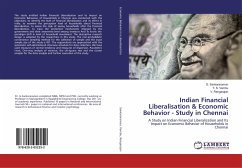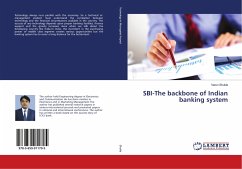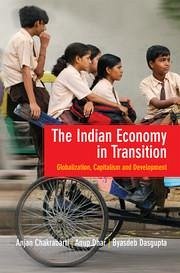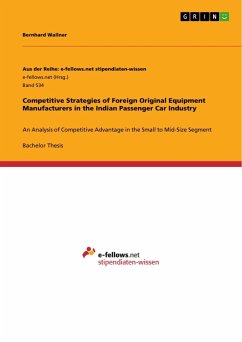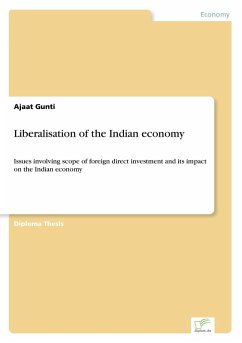
Liberalisation of the Indian economy
Issues involving scope of foreign direct investment and its impact on the Indian economy
Versandkostenfrei!
Versandfertig in 1-2 Wochen
38,00 €
inkl. MwSt.

PAYBACK Punkte
0 °P sammeln!
Diploma Thesis from the year 2001 in the subject Business economics - Business Management, Corporate Governance, grade: 2,3, University of Bamberg (Betriebswirtschaft, Internationales Management), language: English, abstract: Inhaltsangabe:Abstract:With the onset of reforms to liberalise the Indian economy in July of 1991, a new chapter has dawned for India and her billion plus population. This period of economic transition has had a tremendous impact on the overall economic development of almost all major sectors of the economy, and its effects over the last decade can hardly be overlooked. B...
Diploma Thesis from the year 2001 in the subject Business economics - Business Management, Corporate Governance, grade: 2,3, University of Bamberg (Betriebswirtschaft, Internationales Management), language: English, abstract: Inhaltsangabe:Abstract:
With the onset of reforms to liberalise the Indian economy in July of 1991, a new chapter has dawned for India and her billion plus population. This period of economic transition has had a tremendous impact on the overall economic development of almost all major sectors of the economy, and its effects over the last decade can hardly be overlooked. Besides, it also marks the advent of the real integration of the Indian economy into the global economy.
This era of reforms has also ushered in a remarkable change in the Indian mindset, as it deviates from the traditional values held since Independence in 1947, such as self reliance and socialistic policies of economic development, which mainly due to the inward looking restrictive form of governance, resulted in the isolation, overall backwardness and inefficiency of the economy, amongst a host of other problems. This, despite the fact that India has always had the potential to be on the fast track to prosperity.
Now that India is in the process of restructuring her economy, with aspirations of elevating herself from her present desolate position in the world, the need to speed up her economic development is even more imperative. And having witnessed the positive role that Foreign Direct Investment (FDI) has played in the rapid economic growth of most of the Southeast Asian countries and most notably China, India has embarked on an ambitious plan to emulate the successes of her neighbours to the east and is trying to sell herself as a safe and profitable destination for FDI.
The main objective of this thesis is to show whether India is really that attractive as a host to FDI and whether she is likely to succeed in her endeavour to be able to use FDI as a tool to accelerate her economic growth.
In order to achieve this task, starting with the liberalisation process, there will be a brief description of the economic development of India since Independence and its role in leading to the dire economic situation, which ultimately culminated in the initiation of reforms to open up the economy to foreign investors and competition, whereby the reforms relating, directly and indirectly, to FDI will be closely described.
Then there will be a brief explanation of the theoretical background of FDI, i.e. what it exactly means and the driving forces behind it, whereby concentrating mainly on the eclectic theory and then applying it to the prevailing situation in India by concentrating mostly on the location factor , thus, analysing the various advantages which India has, to present herself as a host to FDI.
Subsequently, there will be a presentation of the vital statistics and trends of FDI-inflows into the economy to highlight the effectiveness of the measures undertaken by the Indian government to promote FDI-inflows.
After that, comes a critical analysis of the drawbacks and bottlenecks in the Indian economy, including the hurdles and risks that foreign firms have to face while investing in India, which act as an impeding factor for the realisation of India s goal to be perceived as a favourable destination of FDI. In addition to that, a recent case of a U.S. multinational firms that has already entered the Indian market and is facing enormous problems will be cited.
Finally, after considering all the relevant issues, it will be determined whether India can be trusted as a safe and promising haven for FDI, and also whether the present and expected future growth in FDI-inflows will have the desired effects on the Indian economy.
Inhaltsverzeichnis:Table of Contents:
1.Systematic outline and intent of the presented work1
2.India s economic develo...
With the onset of reforms to liberalise the Indian economy in July of 1991, a new chapter has dawned for India and her billion plus population. This period of economic transition has had a tremendous impact on the overall economic development of almost all major sectors of the economy, and its effects over the last decade can hardly be overlooked. Besides, it also marks the advent of the real integration of the Indian economy into the global economy.
This era of reforms has also ushered in a remarkable change in the Indian mindset, as it deviates from the traditional values held since Independence in 1947, such as self reliance and socialistic policies of economic development, which mainly due to the inward looking restrictive form of governance, resulted in the isolation, overall backwardness and inefficiency of the economy, amongst a host of other problems. This, despite the fact that India has always had the potential to be on the fast track to prosperity.
Now that India is in the process of restructuring her economy, with aspirations of elevating herself from her present desolate position in the world, the need to speed up her economic development is even more imperative. And having witnessed the positive role that Foreign Direct Investment (FDI) has played in the rapid economic growth of most of the Southeast Asian countries and most notably China, India has embarked on an ambitious plan to emulate the successes of her neighbours to the east and is trying to sell herself as a safe and profitable destination for FDI.
The main objective of this thesis is to show whether India is really that attractive as a host to FDI and whether she is likely to succeed in her endeavour to be able to use FDI as a tool to accelerate her economic growth.
In order to achieve this task, starting with the liberalisation process, there will be a brief description of the economic development of India since Independence and its role in leading to the dire economic situation, which ultimately culminated in the initiation of reforms to open up the economy to foreign investors and competition, whereby the reforms relating, directly and indirectly, to FDI will be closely described.
Then there will be a brief explanation of the theoretical background of FDI, i.e. what it exactly means and the driving forces behind it, whereby concentrating mainly on the eclectic theory and then applying it to the prevailing situation in India by concentrating mostly on the location factor , thus, analysing the various advantages which India has, to present herself as a host to FDI.
Subsequently, there will be a presentation of the vital statistics and trends of FDI-inflows into the economy to highlight the effectiveness of the measures undertaken by the Indian government to promote FDI-inflows.
After that, comes a critical analysis of the drawbacks and bottlenecks in the Indian economy, including the hurdles and risks that foreign firms have to face while investing in India, which act as an impeding factor for the realisation of India s goal to be perceived as a favourable destination of FDI. In addition to that, a recent case of a U.S. multinational firms that has already entered the Indian market and is facing enormous problems will be cited.
Finally, after considering all the relevant issues, it will be determined whether India can be trusted as a safe and promising haven for FDI, and also whether the present and expected future growth in FDI-inflows will have the desired effects on the Indian economy.
Inhaltsverzeichnis:Table of Contents:
1.Systematic outline and intent of the presented work1
2.India s economic develo...





